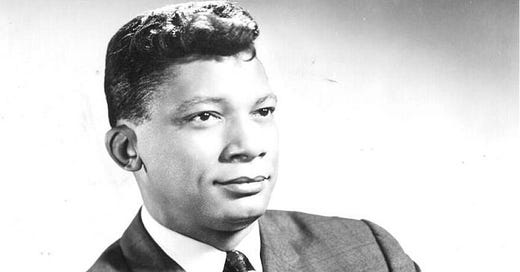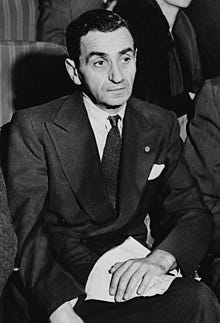Johnny Hartman: They Say It’s Wonderful, by Irving Berlin.
It’s a bit too easy to call Johnny Hartman’s voice ‘mahogany’, and it may be prudent to avoid talk of molasses, in case the angry brigade come knocking. Let’s say his instrument was deep and soulful. On the record he made in 1963 with the John Coltrane quartet he sounds wonderful, as Irving Berlin’s song has it. And, for emphasis: ‘that’s what they say’.
Ethel Merman, on stage, and Betty Hutton, on screen, carried the song to glory in Annie Get Your Gun, that rollicking tale of the sharp-shooting Oakley lass, who boasted ‘anything you can do, I can do better’. Berlin, to his eternal credit, turned that title round when Kiss Me, Kate opened on Broadway. ‘Anything I can do’, he told Cole Porter in a cable, ‘you can do better’.
Berlin and Porter were the supreme all-rounders of the American Songbook, the pair who set words to their own music. Of those who followed only Frank Loesser and Stephen Sondheim managed to master both disciplines, with a mention for Jerry Herman, whose shows (Mame, La Cage aux Folles, Hello, Dolly!) were, let’s be honest, one division down.
By getting in first, and living 101 years, Berlin sits on his own perch. Alexander’s Ragtime Band (1911) is considered to be the first ‘popular’ song, as those remarkable Jewish men growing up on the lower east side of Manhattan borrowed from European models (Viennese operetta, Gilbert & Sullivan) to create something unequivocally American.
Berlin is often underrated, which is odd as he wrote so many classics: Change Partners, Blue Skies, Top Hat, Puttin’ on the Ritz, Let’s Face The Music and Dance, Always, How Deep is the Ocean?, What’ll I Do?, How’s Chances?, Cheek to Cheek. It was his great good fortune that Fred Astaire, the one and only, introduced many of them in those films of the Thirties. Top Hat, of course, remains the finest.
So Berlin was a seasoned campaigner when he wrote Annie Get Your Gun, which gave us two standards: I Got Lost In His Arms (for some reason not used in the film), and They Say It’s Wonderful. The line is actually ‘they say that falling in love is wonderful’; a bit of a mouthful.
When a collaboration with Coltrane was suggested, Hartman wasn’t sure it would work. Trane, as members of his fan club like to call him, was beginning to spiral out of control after working with Miles Davis on Kind of Blue (1959). He had become a virtuoso with little sense of restraint. Davis, fed up with hearing him launch into another interminable solo, asked: ‘why not take the horn out your mouth?’. McCoy Tyner, the pianist in that quartet, said later that by the end of their association all he could hear was noise.
Coltrane was often extremely boring, and frequently ugly. He turned My Favourite Things, Richard Rodgers’s great tune from The Sound of Music, into a fairground act of honking banality, lasting 16 minutes or longer, though we’re not supposed to say that in case his more sensitive admirers start blubbing.
The thing is, he could play the ballads very well. One hesitates to call him a lyrical tenor player, in the manner of Lester ‘Prez’ Young or Stan ‘Young Prez’ Getz, but when he stuck to the top line, and stifled the urge to honk, the fair-minded listener may think ‘you should have done this more often’.
Joining Coltrane and Tyner on the recording were Elvin Jones, the drummer, and Jimmy Garrison on bass, superb musicians, on sparkling form. Hartman shares the honours. His voice is not suited to every song. It can sound a bit ponderous but his measured performance on this LP works well. He handles Lush Life, My One and Only Love, and Rodgers and Hart’s You Are Too Beautiful splendidly, and the disc is now held to be a classic.
Hartman was never a star in the manner of Nat Cole, who conquered white America in a way even Ray Charles couldn’t quite achieve. Cole, who began performing life as a pianist, and a very good one, earned million-selling stardom without spilling a drop of the elixir which made him special, which was quite a feat.
Sammy Davis, of the other black performers, could sell a song like few others. But he was essentially a song and dance man, a vaudevillian. The American Songbook, by and large, belonged to white people. They wrote the songs, arranged them, and usually sang them. Nothing prejudicial about that. It was a cultural thing.
But Hartman had his half hour in the sun. A black man honouring a song composed by a New York Jew about a lady in the wild west who liked to carry a gun. An authentic American tale.
Hendo’s Dozen So Far:
Johnny Hartman: They Say It’s Wonderful, by Irving Berlin.
The Party’s Over by Judy Holliday
Chet Baker, I Get Along Without You Very Well by Hoagy Carmichael
Ella Fitzgerald: It Never Entered My Mind, by Richard Rodgers and Lorenz Hart
Frank Sinatra, Ill Wind by Harold Arlen and Ted Koehler
Judy Garland, Do It Again by George Gershwin and Buddy Da Sylva
Bobby Darin: Once Upon A Time, by Charles Strouse and Lee Adams.
Fred Astaire: I’m Old Fashioned; Jerome Kern and Johnny Mercer.
Lena Horne: It Could Happen to You; Jimmy Van Heusen and Johnny Burke.
Tony Bennett: I Walk A Little Faster; Cy Coleman and Carolyn Leigh.
Peggy Lee: Then I’ll Be Tired of You; Arthur Schwartz and Yip Harburg.





